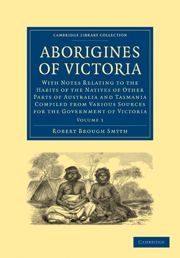 Aborigines of Victoria
Aborigines of Victoria Published online by Cambridge University Press: 05 December 2011
It is not easy to convey correct ideas regarding the mental capacity and faculties of the Aborigines by any general statements. They differ from one another almost as much as uneducated Europeans differ from one another; but while in the latter the capabilities of improvement are very great, in the Australian black they are limited. With keen senses, quick perceptions, and a precocity that is surprising, he stops short just at the point where an advance would lead to a complete change in the character of his mind.
The adult wild native when brought into contact with the whites learns the English language quickly and easily, and all the words that at all resemble those of his own tongue are pronounced distinctly. Those which are harsh, or in which sibilants occur, he softens, and he keeps closely to the grammar of his own language.
Black children brought up in the schools learn very quickly, and in perception, memory, and the power to discriminate they are, to say the least, equal to European children. A Missionary, the Rev. F. A. Hagenauer, a gentleman of great ability, who has the control of the Aboriginal Station at Lake Wellington, reports that the examinations made by the Government School Inspectors show that the Aboriginal pupils taught by him are quite equal to the whites. In his last report he states that the whole of the fifth class in his school had passed the standard examination (that appointed for pupils in State schools), and that they had received certificates.
To save this book to your Kindle, first ensure [email protected] is added to your Approved Personal Document E-mail List under your Personal Document Settings on the Manage Your Content and Devices page of your Amazon account. Then enter the ‘name’ part of your Kindle email address below. Find out more about saving to your Kindle.
Note you can select to save to either the @free.kindle.com or @kindle.com variations. ‘@free.kindle.com’ emails are free but can only be saved to your device when it is connected to wi-fi. ‘@kindle.com’ emails can be delivered even when you are not connected to wi-fi, but note that service fees apply.
Find out more about the Kindle Personal Document Service.
To save content items to your account, please confirm that you agree to abide by our usage policies. If this is the first time you use this feature, you will be asked to authorise Cambridge Core to connect with your account. Find out more about saving content to Dropbox.
To save content items to your account, please confirm that you agree to abide by our usage policies. If this is the first time you use this feature, you will be asked to authorise Cambridge Core to connect with your account. Find out more about saving content to Google Drive.